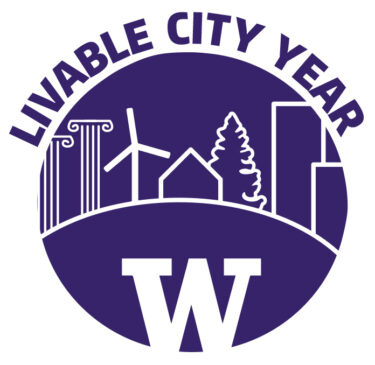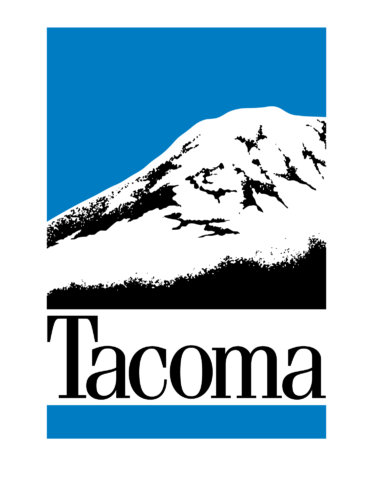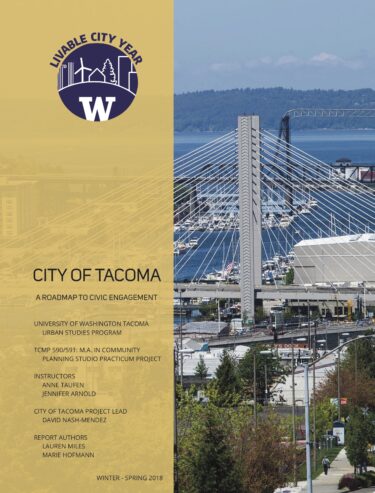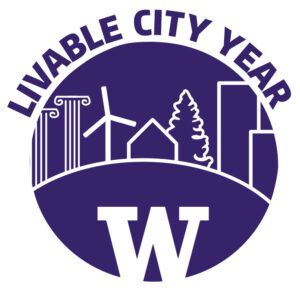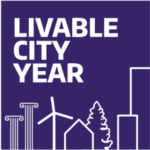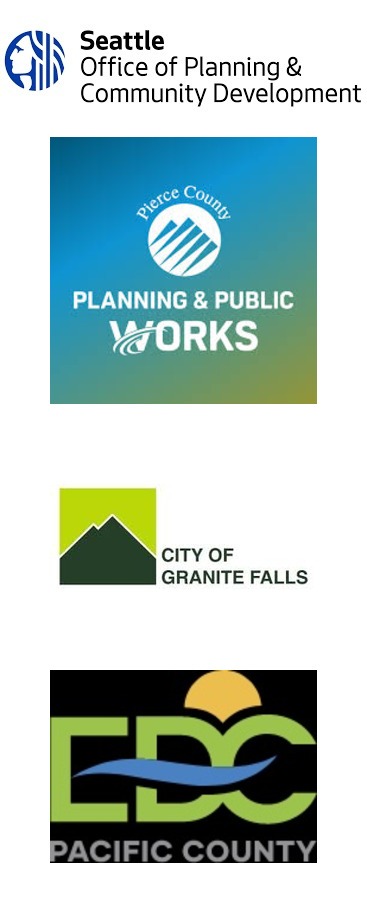A Roadmap to Civic Engagement
Livable City Year 2017-2018 – City of Tacoma
UW Faculty: Anne Taufen Wessells, Urban Studies Program, UW Tacoma
City Project Leads: David Nash-Mendez, City Manager’s Office
Project summary
The Roadmap to Civic Engagement project was created by the City Manager’s Office, with support from the Director of Tacoma Public Utilities (TPU), to better understand how the City of Tacoma approaches civic engagement, with a focus on the organization’s internal practices and values. It builds on community engagement efforts that were initiated as part of the Tacoma 2025 strategic planning process.
In this report, we present key findings and identify opportunities for further organizational investment to promote more inclusive and equitable civic engagement practices across the City of Tacoma.
Civic Engagement: Addressing Equity and Growth
As the City works to promote equity and manage anticipated growth, effective civic engagement and representation of marginalized groups is crucial.
Tacoma is experiencing major growth, with a forecasted population increase of over 60% by 2040, according to the Puget Sound Regional Council. In 2014, significant community engagement efforts aided in the development of Tacoma 2025, the City’s strategic plan and vision for the future. That same year, the City Council passed the Equity and Empowerment Framework, which foregrounds the importance of civic engagement, identifying it as one the document’s five pillars.
However, the recent 2018 Community Survey indicates continued racial disparities in engagement and trust: 60% of White residents rated their confidence in government as “excellent or good” as compared to only 34% of Black residents. Additional disparities exist at the neighborhood level.
Addressing these systemic disparities and adapting for this magnitude of growth may require rapid policy change. Building an infrastructure for civic engagement is one strategy to ensure that policy solutions are effective and attentive to a wide array of resident needs.
Findings
Developed from our analysis of qualitative data, these findings outline the core purposes of doing civic engagement within the City of Tacoma, and summarize some of the key challenges that we heard described by staff across departments.
I. Purposeful Civic Engagement
Values of Civic Engagement
Civic engagement is valued across departments as a path to building equity in Tacoma, and the City is taking steps to align practices with its commitments. Staff expressed the importance of relationships and becoming more inclusive as an institution through expanding access, connecting with community, and building trust, transparency, and accountability.
Variation in Practice and Purpose
In practice, civic engagement varies widely across the City; accordingly, civic engagement performs different functions for each department. Recognizing this variability, uniform standardization of civic engagement across the city poses significant challenges. However, consistent support, allocation of resources, and the development of shared values can enable improved civic engagement practices.
II. Challenges in Practice
Access and Representation
Communities of color, immigrant communities, and low-income communities have been underrepresented in past City civic engagement efforts, which may skew the City’s understandings of the needs of the public. The struggle to consistently have broad representation in decision-making processes may also be compounded by the City’s complex structure.
Understanding Each Other
Many staff perceive a lack of public understanding of the processes and functions of City government. In efforts to be transparent and informative, resources are spent producing and distributing information, or on learning more about public preferences through surveys and other input opportunities. However, this often happens in lieu of opportunities for two-way dialogue and conversation, which can lead to misunderstandings on both sides.
Flashpoints and Catalysts
Flashpoints, or high levels of participation that are passionate or urgent in nature, can emerge around controversial issues. This can cause the City to invest considerable energy on specific decisions and can sometimes come at the expense of more sustained, relationship-building work. However, these moments can also be catalysts for more meaningful engagement.
Recommendations
Our interview data demonstrated that City staff view civic engagement as an important opportunity to build continuous improvement into their work and to strengthen relationships with residents. Across departments, staff voiced interest in increasing the impact of their programs, supporting and coordinating with one another, and operationalizing the Tacoma 2025 values of Opportunity, Equity, Partnerships, and Accountability. However, many departments noted that they require additional support and resources to accomplish these goals.
Our research suggests investments that can further strengthen a culture of universal responsibility for civic engagement within the City of Tacoma.
Part of the 2017-2018 Livable City Year partnership between the University of Washington and the City of Tacoma.
See all Livable City Year projects in Tacoma that UW students and faculty worked on during the year-long partnership.
